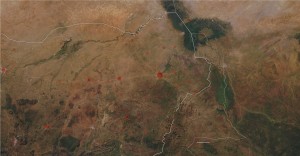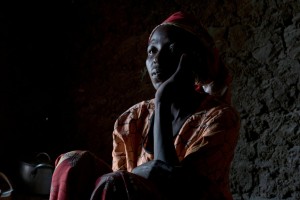Islam In Africa
Islam is one of the oldest and most widely disseminated theologies in the world, and currently is the second most practiced religion after Christianity (Esposito 3). The origins of Islam may be traced to the Middle East, however, the religion’s theology and core tenants quickly spread to the region of Africa. In the book History of Islam in Africa, author Nehemia Levtzion describes the spread of the Islamic faith stating, “Islam reached Africa through two gateways, from the east and the north…From Egypt, Islamic influence extended in three directions, through the Red Seas to the eastern coastal area, up the Nile valley to the Sudan, and across the western desert to the Maghrib” (Levtzion and Pouwels 1). It is widely agreed that Islam first arrived in Africa during the 7th century, a period characterized by the rise of highly advanced civilizations and /or kingdoms. The expansion of Islam to the North and Northwestern African countryside further widened the “popular basis” for religious education (Levtzion and Pouwels 12). Additionally Islam served as an educational catalyst that enabled previously illiterate peasants and herdsmen to gain knowledge of Arabic, and a history of Islamic theology (Levtzion and Pouwels 12). From ancient times through colonial rule and into the 21st century, Islam has served as a vital cornerstone of the cultural and historical fabric of African societies.
Jihad and the Radicalization of Islam
Throughout its history Islam has preached the tenants of peace, compassion, and social unity. In recent years, however, Islam has been subjected to radicalization. From Nigeria’s Boko Haram, to the transnational terrorist organizations of Al-Qaeda and ISIS, the theology of Islam has been severely distorted. The genesis of Islamic radicalization is complicated, however, many scholars agree that Islamic radicalization occurred as a product of The Cold War. In 1979 the Soviet Union invaded Afghanistan and remained in the country as an occupying force until 1989. This proved to be a critical turning point in the globalization and augmentation of Islamic extremism (Esposito 135). Through media coverage and mass communication, the Islamic freedom fighter group known as the Taliban disseminated their distorted doctrine of Jihad. Furthermore, Islamic groups caught between the proxy war of the United States and USSR, felt a growing solidarity with the Taliban (Esposito 135). This solidarity or belief in a holy or just struggle created a global jihadist ideology, an ideology that separated the evil and un-Islamic West from the oppressed and righteous radical movement. In the Quran Jihad is a verb derived from the Arabic word Jahada, meaning to struggle or to strive (Cook 1). It is the interpretation of Jihad, which ultimately separates radical Islamists from the majority of peace- loving Muslim. The struggle or fight of jihad is most widely recognized as the destruction of earth’s evils, the corruption, violence, and pain that plagues society, in essence, “the struggle against one’s desires and selfishness”(Cook 1). In the modern era, radical Islamist groups utilize the theory of Jihad as a justification for violence, murder and martyrdom. Moreover, radical Islam calls for the spread of Islamic rule and the establishment of Sharia Law. Political Scientist Robert W. Hefner describes the rise of Sharia Law stating, “ The Islamic resurgences also gave rise to a more politically ambiguous development: calls for the state to apply a uniform and codified version of Shari’a or Islamic Law”(Hefner 1). Shari’a Law is categorized by five offenses; unlawful sexual intercourse (sex outside of marriage and adultery), false accusation of unlawful sexual intercourse, wine drinking (applies to all alcohol), theft, and robbery (Johnson and Sergie 2). Breaking this set of laws, constitute a variety of punishments varying in severity. Punishments may include, flogging, public humiliation, exile, extraction of limbs, stoning, etc. (Johnson and Sergie 2).
Introduction to Boko Haram
Following the Cold War and the dissolution of the Soviet Union, radical Islam has spread at an alarming rate. Groups such as Hezbollah and Hamas have terrorized the West Bank, while ISIS and Al-Qaeda have struck globally. It is, however, in Africa that radicalization has surged, prompting the formation of violent insurrectionist groups. Most notable and influential of Africa’s Islamic groups is Nigeria’s Boko Haram. Scholar Kyari Mohammed details the genesis of the group stating,
“Boko Haram emerged from a tiny group of Islamist militants who openly challenged the Nigerian state between December 2003 and October 2004 without success…Following a severe military crackdown and changing sub-regional exile dynamics in the Sahel, Boko Haram increasingly adopted the tactics of Salafi Jihadist groups, including assassinations, suicide Bombings, and Hostage taking”(Mohammed 9).
The history and subsequent rise of Boko Haram may be distinguished into three separate, yet overlapping phases. The first stage is known as the Kanama phase (2003-2005), a period characterized by the war waged between a rogue militant group led by Jihadist Muhammad Ali (Not the famous boxer) against the Nigerian government. The second phase of Boko Haram’s rise began with the destruction of Ali’s rebellion and suppression of Islamic groups. Finally, the third stage began in 2009 and continues today, characterized by terrorist activity and killings incited by a resurgent and highly organized Boko Haram (Mohammed 10).

The Historical Background of Boko Haram
During the nineteenth century Nigeria was colonized and subsequently ruled by the British Empire. Due to indirect rule, Nigeria became ethnically and religiously separated. The northern region of Nigeria became predominantly Muslim while the southern region embraced Christianity (Mohammed 11). Attempting to “civilize” the North, Britain employed Christian missionaries to spread education and western culture. However Nigerian’s came to fear and distain Boko or western education (Mohammad 11). Ultimately, a highly educated elite formed within Nigeria, a social class characterized by their evangelized and western tenants. In the years that followed, British colonial rule transferred political power and legitimacy to westernized Nigerians, an action that subsequently established a minority government (Mohammad 12). As time passed, Nigeria’s Muslim majority increasingly resented the government; an institution believed to exploit traditional Nigerian values (Islamic values) and betray the Nigerian people. It was this slow burning antagonism that finally came to an explosive head in the early months of 2003. During this period groups of militant Islamic “freedom fighters” coalesced and organized into what is today known as Boko Haram.
The Motivation of Boko Haram: A Scholarly Debate
In the Essay Boko Haram and its Muslim critics: Observations from Yobe State, scholar Johannes Harnischfeger states, “Young militants in Maiduguri or Kano have good reasons to hate the representatives of the state. Their rebellion is born out of poverty, illiteracy, and unemployment; it is a response to corruption and social neglect”(Harnischfeger 35). Harnischfeger argues that the motivation of Boko Haram, as well as the attraction for joining such a group, is the opportunity to cleanse a corrupt political institution (Harnischfeger 36). Harnischfeger by no means condones the actions of Boko Haram, rather asserts that Boko Haram utilizes Islam to combat the century old issues of political corruption and social immobility. Yet despite Nigeria’s political corruption and social stratification, Boko Haram leaders insist that their insurgency stems from purely religious motives. As one unnamed Boko Haram leader stated, “This is a war between Muslims and non-Muslims… this is not a tribal war, nor is it a war for financial gains, it is solely a religious war (Harnischfeger 35). Scholar Daniel Ikechukwu Ikerionwu offers a contrary argument to Harnischfeger. Ikerionwu asserts that the motivation and ultimate creation of Boko Haram is not a response to the condition of the Nigerian state, but rather a product of radical Jihad and anti-western sentiment. Ikerionwu asserts, “The global Islamic resurgence, characteristic of the post-Cold-War period is one of the causal factors associated with Boko Haram insurgency in Nigeria. Of all world civilizations, the most contending forces are Islam and the West”(Ikechukwu 16).
Terrorist Actives of Boko Haram
In a 2011 House of Representatives meeting, the subcommittee on counterterrorism and intelligence described the danger of Boko Haram:
“What makes Boko Haram particularly concerning is how quickly it has grown
over the past few years from a local militia to a more complex terror
organization which earlier this month carried out a series of coordinated
suicide bombings in several cities across the country (Nigeria), killing dozens
of people…Perhaps the most troubling aspect of the threat posed by Boko
Haram is the reports of increasing ties between the group and other terrorist
groups, including AQIM in North Africa and Al-Shabaab in Somalia. The
reported commingling of weapons, tactics, and personnel among these
groups may be one reason that Boko Haram has reportedly been able to
quickly develop its bomb-making expertise and tactics” (Boko Haram).
There is no debate that the ferocity and frequency of Boko Haram’s attacks have increased in recent years. One particularly troubling aspect of Boko Haram’s recent activity is their trend in mass abduction and rape of young girls. In an interview with the Independent, a young girl named Yada describes her experience, “When you are with them (Boko Haram), there is a constant fear that they can kill you. Or maybe the bombs or stray bullets from the government soldiers can also kill you. It was terrible…they said our men were pagans and they would marry us themselves. So the day before marriage, we jumped over the fence and ran”(Withnall). To this day Boko Haram continues to amass power and consolidate a highly sophisticated terrorist network. It is unclear what the future holds for the state of Nigeria and the future effects that Boko Haram will have on Nigeria and the region of northern Africa.

Works Cited
“Boko Haram-Emerging Threat to the United States.” Committee on Homeland Security:
Hearing Before the Subcommittee on Counterterrorism and Intelligence (One Hundred Twelfth Congress Serial No. 112-60). 30 November 2011, pg. 3.
http://www.gpo.gov/fdsys/. Accessed 28 April 2016.
Cook, David B. Understanding Jihad. Berkeley: University of California Press. 2005.
http://discovere.emory.edu. Accessed 28 April 2016. Pg.1.
(“Woodruff” 51307035200002486 online)
Esposito, John L. What Everyone Needs to Know About Islam. London: Oxford University
Press. 2011. Pg. 135. http://site.ebrary.com/lib/emoryac/reader.action?docID=10509729&ppg=24.
Accessed 28 April 2016. (“Woodruff” 51309380880002486 online)
Harnischfeger, Johannes. “Boko Haram and Its Muslim Critics: Observations from Yobe
State.” In Islamism, Politics, Security and the State in Nigeria. Edited by Marc-Antoine Perouse de Montclos. Enschede, Netherlands: African Studies Centre Pub. 2014. Print.
pgs. 35-36.(“Woodruff” HV6433.N62B6542014)
Hefner, Robert W. Shari’a Politics Islamic Law and Society in the Modern World.
Bloomington, IN: Indiana University Press. 2011. Pg. 1.
http://discovere.emory.edu. Accessed 28 April 2016.
Ikechukwu, Daniel. “The Islamic Resurgence and Boko Harm Insurgency in Nigeria.”
Diss. University of Massachusetts Lowell, 2014. Pg. 16. Proquest 1525215.
Accessed 28 April 2016.
Johnson, Toni and Mohammed Sergie. “Islam: Governing Under Sharia.” Council on Foreign
Relations, 25 July 2014. Pg. 2. Http://cfr.org/religion/islam-governing-under-sharia/p8034. Accessed 28 April 2016.
Levtzion, Nehemia and Randall Pouwels. The History of Islam. Athens: Ohio University
Press. 2000. pgs.1-12. http://site.ebray.com/lib/emoryac/reader.action?docID=10606571&ppg=32.
Mohammed, Kyari. “The Message and Methods of Boko Haram.” In Islamism, Politics,
Security and the State in Nigeria. Edited by Marc-Antoine Perouse de Montclos.
Enschede, Netherlands: African Studies Centre Pub. 2014. Print. pgs. 9-12.
(“Woodruff” HV6433.N62B6542014)
Withnall, Adam. “Two Years After Chibok, Boko Haram Survivors Describe How They Can
Never Truly Escape.” Independent. 15 April 2016.
Http://www.independent.co.uk/news/world/Africa/embargo-8am-friday-two
Years-after-chibok-boko-haram-survivors-describe-how-they-can-never-truly-
A6984601.html.
This really is actually quite fascinating, and suggests a potential avenue of research. Strange are the threads that are woven through history.
Ramdhan is the month of mercy for the Muslims. Each good done in this month is given reward 70 times. It is the time when the Devils arechained and the baab of Heaven are open.
Ramdhan is the month of blessings for the believers. Each deed done in this time is rewarded 70 times. It is the month when the Shayatin areheld up and the gates of Jannah are open.